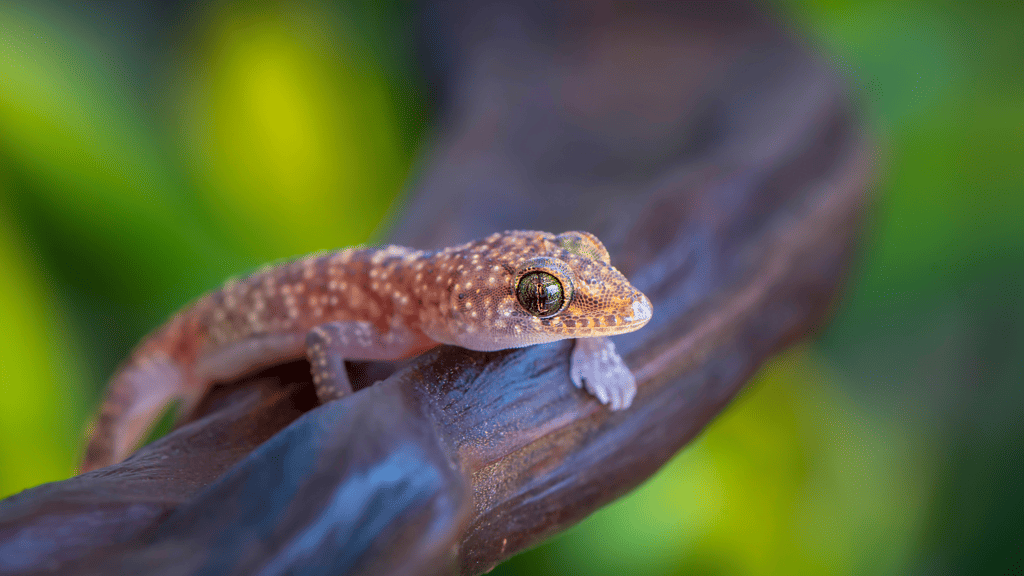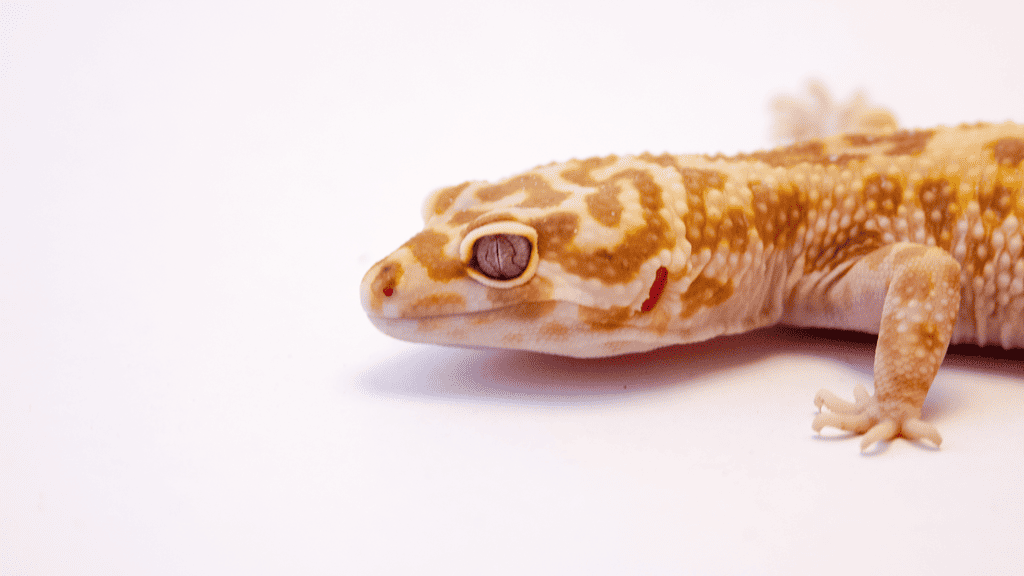Geckos are one of the most common lizards in the world. They are known for their ability to climb walls and stick to ceilings. Geckos come in a variety of colors and can be found on every continent except Antarctica. But how do these creatures sleep? Do they sleep hanging upside down? Do they curl up in a ball? Keep reading to find out how geckos sleep and why they are able to stick to surfaces.

Geckos are crepuscular animals that are primarily active at night. Geckos have a routine of sleeping during the day and become more active as the day comes to an end. The geckos will stay active throughout the night, with just a tiny rest period between midnight and daybreak the following day.
If you had intended to spend time with your new pet during the daytime, you might be disappointed to find out that geckos are more active at night.
Continue reading to discover further information on the sleeping patterns of geckos, including specifics about when they sleep and what they do while they are awake.
Do Geckos Have Eyelids?
The geckos don’t have eyelids. They have a thick, protective membrane that covers their eyes in place of eyelids, and they use their tongues to help keep their eyes clean, moist and lubricated. This membrane replaces their eyelids.
This membrane functions similarly to a transparent membrane that covers the interior components of the eye. The scale is also called a spectacle. The pet gecko will simply clean the spectacle by licking it when it becomes dry or coated with dirt or dust.
How Do Geckos Sleep?
The solution to this question is quite puzzling. It’s difficult for us to think about sleeping with our eyes open. The gecko, on the other hand, behaves exactly in this manner.
However, since their pupils are so large, very little light can penetrate their eyes, allowing them to sleep. It might seem unusual to us, but it is normal for their species, and as a result, they appear to have no trouble doing it.
Giving them an excellent place to hide in their tank is essential, as they usually sleep while hiding. You may also use synthetic branches or vegetation to create a natural-looking hiding area. Because geckos often do not possess eyelids, it is rather difficult for humans to conceptualize how they can sleep with their eyes open.
Geckos live and sleep most of the time without eyelids. At first, it might seem strange, but it is natural for some animals to sleep without shutting their eyes. Whenever they want to sleep, they will frequently squeeze their eyelids shut. It blocks as much light as possible from getting in, preventing damage to the wearer’s eyes. They can relax and fall asleep more easily as a result of this. It’s also a good idea to put live plants in their cage that won’t hurt them if they eat them.
Do Geckos Keep Their Eyes Open When They Sleep?
Yes. At least 12 hours a day, geckos sleep with their eyes open. When they sleep, they frequently prefer to conceal themselves behind the bark or the leaves of trees. They will do everything they can to help their pupils rest and sleep.
Geckos without eyelids or eyelashes can be hard to find when they sleep. To know when they sleep, you must recognize the signs.
How Long Does a Gecko Need to Sleep?
Geckos have a daily sleep need of ten to twelve hours, depending on their age. The geckos sleep before the sun rises, and you can find them awake after it has set.
They are most active at night, just before dawn, and very early in the morning. Depending on what they do and how they live, different geckos sleep for different amounts of time.
Each gecko has the potential to be unique in its term. Geckos kept in captivity tend to sleep for around 12 hours a day.
Geckos are no different from any other animals in that their levels of activity and routines, including when they sleep, can vary significantly from one individual to the next. Some geckos have a habit of sleeping for more than hours, while others like to sleep for a shorter amount of time.

Why Do Geckos Sleep All Day?
Extreme Heat
During the summer months, the temperatures in hot regions might reach well beyond 104 degrees Fahrenheit. Geckos don’t do well in scorching weather, so they have to hide when the weather is bad.
Geckos sleep throughout the day to avoid the heat and hot sand. Most leopard geckos remain hidden until the sun goes down, either in burrows or cracks. This is why giving your pet gecko more than one place to hide is essential.
Body Composition
Geckos need their fat stores to keep them alive, especially when hibernating. Geckos have a very tough time storing fat when the temperature is very high throughout the day. So geckos choose to sleep during the day and eat at night when it is much more relaxed.
What Factors Affect Gecko Sleep Patterns?
Several things can affect pet gecko sleep. Here are several elements that affect how long geckos sleep:
Lighting
When it is time for them to sleep, geckos do not require an excessive amount of light. You might want to consider lowering the lights in the area where your geckos sleep during the day.
Enclosure
It will be simpler for you to regulate their sleep cycle if you provide your leopard geckos with a number of different hiding spots where they may fall asleep.
Illness
Sick pet geckos may sleep too much or too little. However, shifts in sleeping habits aren’t the only sign that your gecko may be sick; you should also look for other symptoms. Visit a vet as soon as possible if you are unsure when your geckos’ sleeping patterns will alter.
Diet
If you feed your geckos at the incorrect time, it may throw off their natural sleeping schedule. You must provide your geckos with food in the evening to forestall any significant disruptions to their normal sleeping routine.
How Can You Tell if a Gecko Is Asleep?
You can tell if a gecko is sleeping or awake in a few ways.
- Constricted pupils: If the room is dark and a gecko sleeps, its pupils will probably close. This would be the opposite of what it would be doing if it were awake.
- Sunken eyes: This is hard to explain, but compared to when awake, their eyes look slightly lower in their heads when sleeping. It will look like they are almost frowning at you.
- Crests that lay down: The crests that usually stand up will lay down much flatter to the body. This is one of the more apparent signals to look for when determining whether or not a crested gecko is sleeping.
What Do Geckos Do While Awake?
Geckos are typically housed in a “reptile room,” “living room,” or “bedroom,” according to the owner’s preference. Geckos, unlike pet rodents, don’t run on exercise wheels and won’t run around their terrarium for miles.
When awake, geckos can make some peculiar chirping and even barking noises. These noises are often not very loud and will occur more frequently when the gecko is kept alongside other gecko species. Your pet gecko may produce noises if it’s feeling uncomfortable or upset.
How to Help Your Gecko Sleep
You can ensure that your gecko continues to get the much-required rest required during the day. These reptiles will sleep more soundly if you do the following, in addition to maintaining an extremely calm environment surrounding their enclosure:
- Make sure their vivarium has plenty of places for them to hide.
- The enclosure should be in an area that has a complete cycle of darkness and light.
- During the day, you should turn off any bright lights surrounding the tank during the day.
- Feed your reptiles just before it becomes dark.
- Vivariums shouldn’t be near windows or chilly locations.
- If at all feasible, keep your geckos in their aquariums.
- Maintain your gecko’s aquarium at the appropriate temperature
- Avoid playing loud music close to your gecko.
Finally, you should avoid handling your gecko too much before they go to sleep. While they may seem like they’re always up for a cuddle, handling them before bedtime can actually keep them awake and make it harder for them to fall asleep. If you must handle them, try to do so at least an hour before they’re due for some shut-eye.
If you follow these procedures, allowing your gecko to have more hours of sleep during the day should be much simpler.
